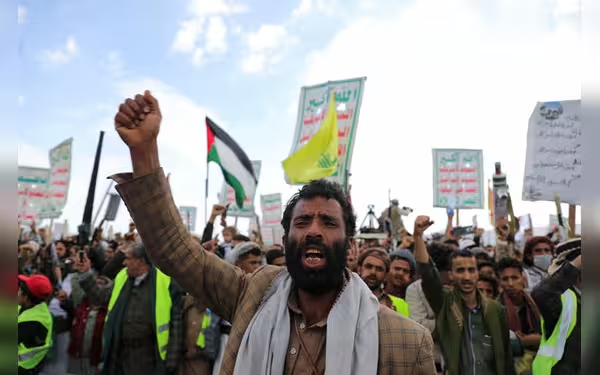Saturday, November 16, 2024 07:44 PM
US and UK Conduct Airstrikes in Sanaa Against Houthi Rebels
- US and UK launch airstrikes on Houthi positions in Sanaa.
- Houthi attacks disrupt global trade routes in the Red Sea.
- Escalating conflict raises concerns over regional stability.
 Image Credits: thefrontierpost
Image Credits: thefrontierpostUS and UK launch airstrikes in Sanaa targeting Houthi rebels, escalating the ongoing conflict and disrupting vital trade routes.
In recent developments, the ongoing conflict in Yemen has escalated with the United States and Britain launching airstrikes on the capital city, Sanaa. This military action is part of a broader strategy to counter the Iran-backed Houthi rebels, who have been accused of targeting international shipping routes in the Red Sea and Gulf of Aden. The Pentagon confirmed that these strikes were aimed at advanced weapons storage facilities used by the Houthis, which pose a significant threat to both military and civilian vessels navigating these crucial waterways.
According to reports from the Houthi-run Al Masirah television network, the airstrikes occurred in the southern Al Sabeen district of Sanaa. Eyewitnesses described the scene as chaotic, with intense flying and explosions echoing throughout the capital. This latest round of strikes is not an isolated incident; the US and UK have been actively targeting Houthi positions since January, responding to a series of attacks on shipping that have disrupted maritime traffic in this vital region.
The Houthis have justified their actions by claiming that their attacks are aimed at vessels linked to Israel, asserting that they are standing in solidarity with the Palestinian cause amid the ongoing Gaza conflict. This has led to a significant disruption of trade routes, with the Red Sea carrying approximately 12 percent of global trade. Over the past year, the Houthis have conducted more than 100 attacks, resulting in the deaths of four sailors and the sinking of two ships. Additionally, one vessel and its crew have been held captive since being hijacked last November.
Interestingly, these strikes come shortly after Houthi leader Abdul Malik Al-Houthi publicly criticized US President-elect Donald Trump. Al-Houthi accused Trump of failing to bring peace to the Middle East, particularly through normalization deals between Arab nations and Israel. This rhetoric highlights the complex interplay of regional politics and the ongoing conflict, suggesting that the situation in Yemen is deeply intertwined with broader geopolitical issues.
As the situation unfolds, it is crucial to understand the implications of these military actions not only for Yemen but for global trade and regional stability. The conflict has already had devastating effects on the Yemeni population, and continued military engagement may further complicate efforts for peace. Observers are left to ponder whether these strikes will indeed deter Houthi aggression or if they will escalate tensions even further, leading to a cycle of violence that could have far-reaching consequences.













